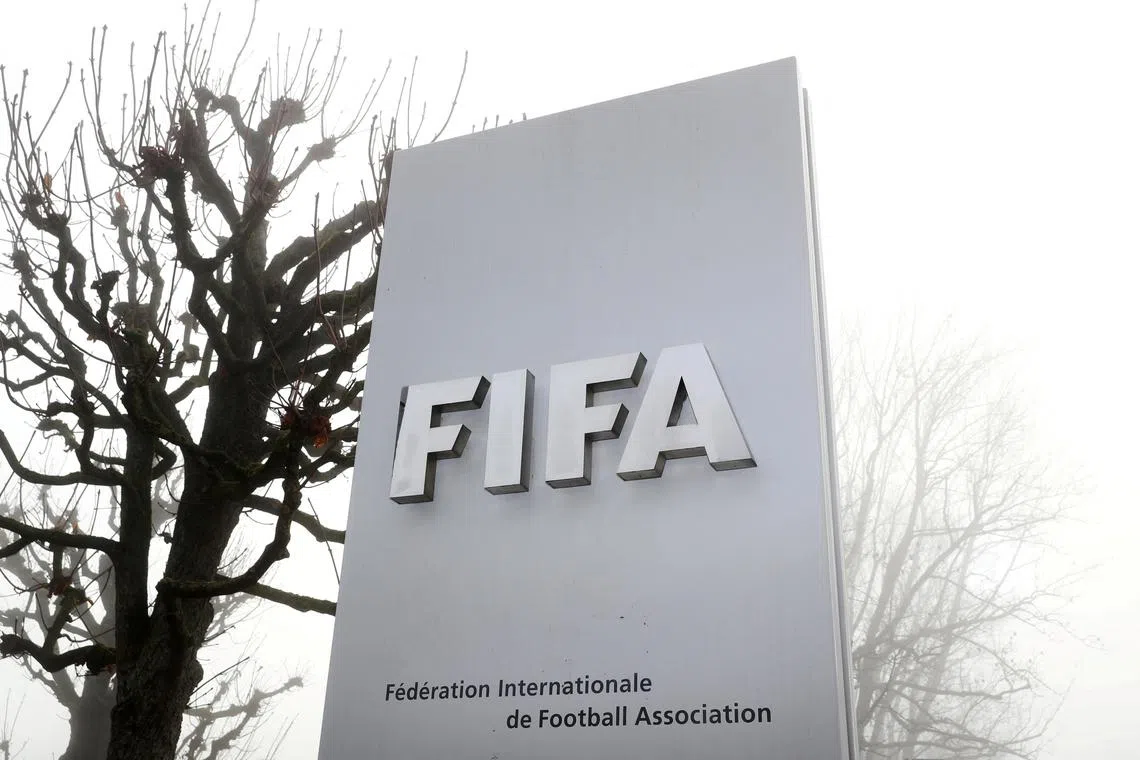Saudi Arabia’s 2034 World Cup bid gets higher score than United States, Canada and Mexico in 2026
Sign up now: Get the biggest sports news in your inbox

Votes are due to be held at the Fifa Congress in December to approve the 2030 and 2034 World Cups, though each has only a single bid.
PHOTO: REUTERS
Follow topic:
ZURICH – Saudi Arabia’s 2034 World Cup bid received a higher technical score from Fifa than the 2026 joint-bid by the United States, Canada and Mexico, even though the Middle Eastern nation has yet to construct several stadiums proposed for the quadrennial tournament.
Football’s global governing body released its bid evaluation report and said the 2034 bid received an overall average score of 4.2 out of five, even though eight stadiums are still to be built.
All venues – including the planned 92,760-seat King Salman International Stadium in Riyadh – will not be completed until 2032 but three new stadiums are expected to be finished for the Asian Cup, which kicks off in January 2027.
The 2026 bid scored 4.0, having initially proposed 23 stadiums – all of which were already built.
Eventually, 16 host cities for the 2026 World Cup were announced, with many venues in the US and Canada being existing National Football League stadiums.
“The (Saudi) bid includes some ambitious stadium projects integrated into unique locations, including the Prince Mohammed bin Salman Stadium located within the Qiddiya development and Neom Stadium located within ‘The Line’ development,” Fifa’s report said.
It added that although Saudi Arabia’s “one-of-a-kind” stadium projects have a lot of potential, the “proposed configuration and location” would “require a reimagining of operations, with some associated unknowns or challenges at this moment in time”.
Neom, a Red Sea urban and industrial development nearly the size of Belgium due to house nearly nine million people, is central to the prince’s Vision 2030 plan to create new engines of economic growth beyond oil.
But some of the schemes have had to be scaled back due to rising costs, including “The Line”, a futuristic city between mirrored walls extending 170km into the desert within Neom.
Stadiums account for 35 per cent of the overall score awarded to bids and Fifa said the level of risk in the 2026 bid was low. However, the Saudi bid had a medium level of risk.
“Due to the overall scale of the stadium projects, as well as the novel designs and configurations proposed in some cases, there is an elevated risk profile,” Fifa said.
However, it added that the risk was mitigated as Saudi Arabia has a strong team in place and ample time to deliver on the projects.
Ahead of the World Cup vote in December, Saudi’s Minister of Sports Prince Abdulaziz bin Turki Al Faisal said Fifa’s score reflects the country’s commitment to grow the game and their “rapid transformation”.
Votes are due to be held at the Fifa Congress on Dec 11 to approve the 2030 and 2034 World Cups, though each has only a single bid.
Saudi Arabia is the lone bidder for 2034 while a combined bid from Morocco, Spain and Portugal is the sole one for 2030. The 2030 World Cup bid also received a score of 4.2.
Fifa said the Saudi bid did not stipulate a proposed window for the World Cup but they would collaborate with stakeholders to “determine the optimal timing” for the tournament.
Due to the country’s desert climate, the 2034 World Cup may be pushed to a winter slot – just as Fifa did with the 2022 edition in neighbouring Qatar.
The Saudi bid was considered “medium risk” for human rights by the report, which said implementing reforms could take “significant time and effort”.
It said: “In terms of human rights, the undertaking involved in implementing the various measures... particularly in certain areas, could involve significant effort and time...
“It is important to note that the bid involves significant opportunities for positive human rights impact.”
However, Amnesty International accused Fifa of an “astonishing whitewash” in the wake of its report.
“Fifa’s evaluation of Saudi Arabia’s World Cup is an astonishing whitewash of the country’s atrocious human rights record,” Amnesty’s head of labour rights and sport Steve Cockburn said.
“The sports body has decided to ignore the clear evidence of worker exploitation, legalised discrimination and severe repression, and press ahead with a predetermined decision...
“Unless huge human rights reforms are introduced, people will be exploited, evicted from their homes and even die as a result.” REUTERS, AFP

